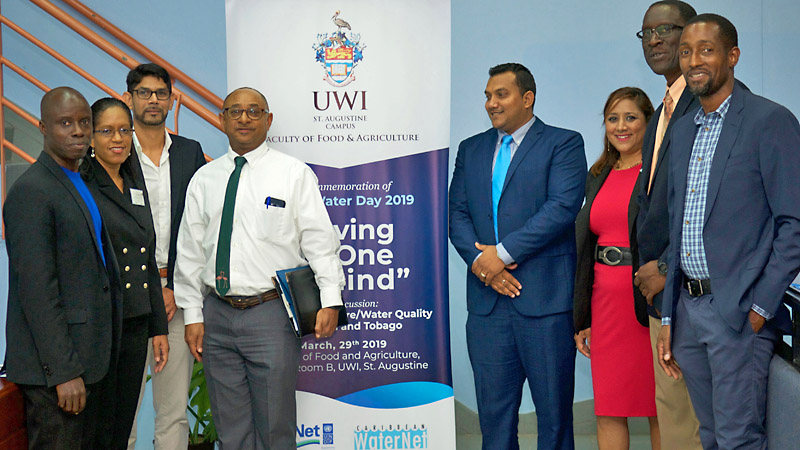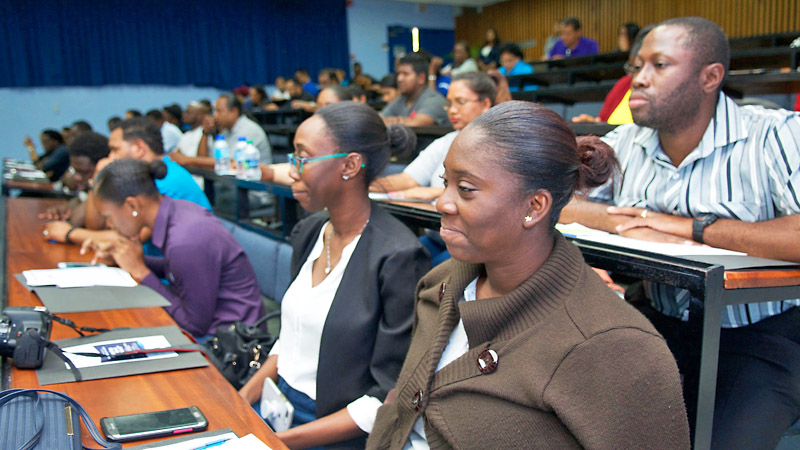In commemoration of World Water Day 2019 a panel discussion on Water Resource Management in Trinidad and Tobago, with special focus on the agricultural sector, was organized in collaboration with Caribbean WaterNet, CapNet UNDP and the Caribbean Academy of Sciences. The event was hosted by the Department of Food Production of the University of the West Indies, St. Augustine Campus.
The feature address was given by the Minister of Agriculture, Land and Fisheries, Senator The Honorable Clarence Rambharat. He ignited calls for further research efforts and dialogue towards improved management of our water resources. The minister also praised the initiative, stating that it is a key step towards addressing the long standing issue of fragmented governance that has plagued our system and undermined the sustainable use and management of our natural resources.

Panel discussion collaborators and panelists. From left to right: Dr. Mark Wuddivira, University of the West Indies; Ms. Wendy Nelson, Institute of Marine Affairs; Dr. Ronald Roopnarine, Caribbean WaterNet; Mr. Hayden Romano, Environmental Management Authority; Senator Avinash Singh, Ministry of Agriculture, Land and Fisheries; Dr. Sharda Mahabir, Adopt a River/WASA; Captain Neville Wint, Office of Disaster Preparedness and Management; Dr. Gaius Eudoxie, University of the West Indies.
All panelists gave a short presentations on the strategies of their respective institutions aiming to improve water quality and distribution. Dr. Mahabir emphasized the importance of a community based approach and presented some examples about a river programme that has improved water quality in various watersheds in the country. Mr Romano explained the challenges faced by the EMA in enforcing existing water pollution rules as well as the limitations of the rules themselves.
Captain Wint highlighted the challenges faced by his institutions and the public misconceptions attached to the roles and responsibilities of the ODPM. Senator Singh focused on initiatives sanctioned by the government that hope to address improved water management. Ms. Nelson touched on the importance of an integrated approach to water resource management and the influence of fresh water systems on marine ecosystems. Professor Opadeyi completed the panelist presentations with a call for improved policies and laws, particularly those pertaining to land tenure that limits access at various points of river basins.
Panelists provided unique and thought provoking perspective that enlightened the audience and set the tone for discussion. One of the questions stirred an interesting debate amongst panelist as it focused on the issue of enforcement of laws that govern water resources. Ultimately, panelist agreed that this is a major challenge and an area that urgently needs attention.
The event ended with the launch of a book Water Quality in the Americas: Risks and Opportunities. It focuses on the problems and management of water quality and it’s published by InterAmerican Network of Academies of Sciences and Inter Academy Partnership. The book was developed in close collaboration with the Regional Bureau for Sciences in Latin America and the Caribbean of UNESCO in Montevideo, specifically with the International Hydrological Program for Latin America and the Caribbean.
The launch event highlighted for example a chapter Gender, Women and the Quality of Water which is co-authored by Professor Neela Badrie of the DFP, UWI. It focuses on an important but often overlooked component of water quality and its relationship to gender, and specifically to women who are most often charged with the responsibilities of water usage at home as well as in agricultural production.
The event provided the necessary impetus towards alleviating challenges in effective management of water resources, while simultaneously highlighting current initiatives. All collaborating agencies expressed their support for future ventures of this nature. ')}
